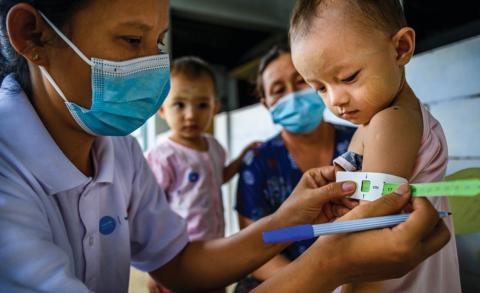Scaling up severe wasting programming
This is a summary of the following report: Action Against Hunger, International Rescue Committee, Save the Children UK, and UNICEF (2023) Scaling up coverage, quality and sustainability of early detection and treatment of severe wasting programming for children. https://www.nutritioncluster.net/resources/delivery-systems-scale
Child wasting, a preventable condition, critically impacts children's ability to survive and thrive. While evidence-based approaches to treat severe wasting exist, the challenge lies in effectively providing these services to the most at-risk children. The 'Delivery Systems for Scale' project (December 2022 to September 2023) was developed by International Rescue Committee, Action Against Hunger, and Save the Children, in partnership with USAID and with support from UNICEF. The project focused on three core areas: Country-driven support, coordination and learning, and technical and coordination support.
A project learning component reviewed global progress scaling up coverage, quality, and access to detection and treatment programmes for children with severe wasting from 2013 to July 2023, building on a 2013 global stocktake by Action Against Hunger and the Coverage Monitoring Network (ACF, 2013).
Over the past decade, significant progress has been made through collective efforts by national governments, NGOs, UN agencies, civil society, and donors. Increased financing resulted from joint advocacy and donor engagement, leading to incremental integration into national systems through expanded policies and resources. Developments in information systems laid the foundation for systematic adoption and tracking of national and global targets. Country-level scaling action was supported through various global and regional activities to address barriers.
Key enablers for this progress included sustained advocacy, predictable technical support, and coordinated research agendas. Country-level technical working groups played a crucial role in mobilising action and addressing technical and operational shortfalls. The launch of the UN Global Action Plan for Wasting in 2020 and the 2023 WHO Guideline for the prevention and management of acute malnutrition present new opportunities to accelerate prevention and treatment efforts.
Despite this progress, the report showed that challenges persist. Health system fragility, inadequate human resources, limited political will, and insufficient funding continue to hinder scaling efforts. Collaboration between health and nutrition sectors, as well as engagement with the private health sector, remains critical. Fragmented knowledge management also poses barriers. Improvements in data collection, analysis, and use have been made, but gaps in data proficiency and accountability persist. The expansion of financing instruments requires better coordination and tracking to optimise resources effectively. Significant advancements in materials and supplies, particularly with Ready-to-Use Therapeutic Food, highlight the need for optimisation of national supply chains.
Moving forward, a child-centred systems approach is recommended to integrate prevention, early detection, and treatment of child wasting. There are five key recommendations from this analysis which can be taken forward. First, to define and implement methods to integrate routine detection and treatment of child wasting within national health systems. Second, to strengthen knowledge management by investing in retrospective and prospective learning and commit to simplicity and clarity in communication. Third, review and update success metrics, including targets, monitoring, and accountability frameworks, aligning them with national government priorities. Fourth, leverage the 2023 WHO Guideline and the 2020 UN Global Action Plan for Wasting rollout, along with momentum on universal healthcare, to address governance, prioritisation, and resourcing gaps with national actors. Fifth, define and strengthen collaboration with the private sector within frameworks that support child health and nutrition.
References
ACF (2013) A decade of community-based SAM management 2013. https://www.ennonline.net/ourwork/othermeetings/communitybasedsam2013


